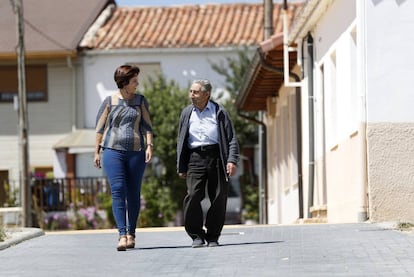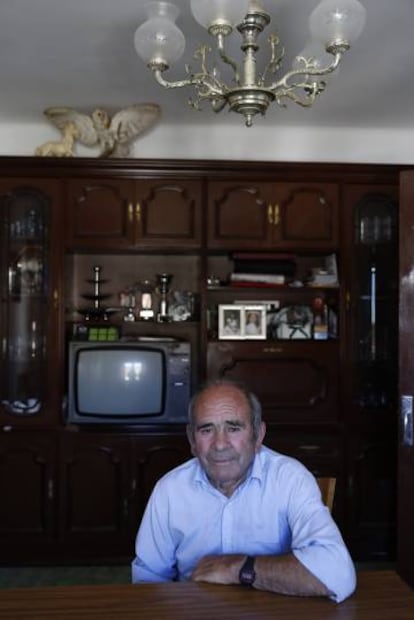Learning to love your village
A hamlet in Soria is fighting the side effects of depopulation with positive psychology


In Ituero, a village on the River Duero, there are 40 stone cottages, a church with a bell and a community center with an aluminum bar that serves lemon shandy in the summer. The old schoolmaster’s house has not been touched since he left and there is a health clinic down the road where the basic tools of the trade have not been moved since it closed. A stray dog wanders the deserted streets, liable to bite strangers. But there aren’t many of those around. Mostly there is silence, particularly on a winter’s evening when Moisés, the only inhabitant in the coldest months of the year, puts out the light and goes to sleep.
In Ituero’s district of Cubo de la Solana, it’s not unusual to go the whole day without seeing anyone in winter
In Ituero’s district of Cubo de la Solana, it’s not unusual to go the whole day without seeing anyone in winter. The 193 remaining villagers, spread among six hamlets, are keeping warm behind the stone walls of their cottages. Alone in Ituero, Moisés doesn’t remember ever having seen the sea and can count the nights he has spent elsewhere on the fingers of one hand, occasions when a nephew or niece was getting married out of town. Even then, he had to get back to feed the sheep, given no one else was around to fill in.
To break the monotony, he goes into Soria in his old car to meet his friends for a few glasses of wine once a week. The rest of the time, he stays in the village and speaks to no one.
But things are about to change for this 80-year-old farmer as the first initiative of its kind in Spain is set in motion by the local mayor, Juanjo Delgado, who is trying to combat the loneliness that comes from living in these abandoned rural areas with positive psychology, a method established by Martin Seligman in the 1970s.

In a place that has just 1.45 inhabitants per square kilometer – exceptionally low even for Soria, where 91% of the villages are officially considered deserted – Delgado believes it’s necessary to address the issues that accompany such desolation. “Winters here are hard,” says Delgado. “There is a lot of time and nothing to do. You can go days without seeing anyone. The idea is to coax the villagers out of their homes to socialize, which will help improve morale.”
The psychologist hired by the mayor is Iratxe Bolaños. In rural areas, success is generally equated with moving to the city while staying put or coming back to the village is associated with failure. But Bolaños, 36, who came to these villages five years ago after fleeing a life in the city, is determined to tackle the stigma. Though at first she was met with the grim stares of “España vacia,” a phrase coined by journalist Sergio del Molino to describe the landlocked rural interior, once she gained the confidence of the locals, she started to see that she could help raise their self-esteem using group sessions and has organized a program due to begin in September.
“There is a lot of depression in rural areas,” says Bolaños from the community center in Lubia that doubles as a bar, but serves no more than two or three coffees a day. “No one wants anyone to know about their problems. Nights draw in early and there is a sense of deep isolation. But by chatting to each other, getting to know each other and opening up, we can overcome the loneliness.”
The idea is to coax the villagers out of their homes to socialize, which will help improve morale Mayor Juanjo Delgado
Getting the locals together should prove positive, but there is the danger of opening old wounds. Doña Petra looks out from behind her washing. “So now we’re getting a psychologist!” she says to her husband Hipólito, who still remembers when he was mayor and had his budget taken from him when the villages were consolidated for administration purposes. It still hurts but he is willing to “do psychology” if he has to.
Asked about his life, Hipólito tells his tale. “Look, my father died of tuberculosis and we had to burn his bed. My pregnant mother was left to bring up three children. Two years later, my 18-month-old brother drowned in the river. The autopsy was done there, over the road. The problem was that they left the door open while they did it, and my sister saw it and died two weeks later from the shock.”
Asked when he had been happiest, Hipólito has a stark reply: “Never.” Petra tells him to stop talking nonsense because it will all be printed in the newspaper. Hipólito hasn’t seen Moisés since 1983. Although they live only kilometers apart, it’s been three decades since they spoke. The psychologist hopes to get them sitting at the same table, playing cards or just chatting, with Moisés telling stories about his sheep and how he did in fact once see the sea in Gijón and Hipólito recounting memories of his sister’s autopsy and the time he shook hands with former Prime Minister Felipe González. At least for a few hours, they might feel a little happy. But this needs to happen now before they lose their memories and this part of Spain empties out for good.
English version by Heather Galloway.
Tu suscripción se está usando en otro dispositivo
¿Quieres añadir otro usuario a tu suscripción?
Si continúas leyendo en este dispositivo, no se podrá leer en el otro.
FlechaTu suscripción se está usando en otro dispositivo y solo puedes acceder a EL PAÍS desde un dispositivo a la vez.
Si quieres compartir tu cuenta, cambia tu suscripción a la modalidad Premium, así podrás añadir otro usuario. Cada uno accederá con su propia cuenta de email, lo que os permitirá personalizar vuestra experiencia en EL PAÍS.
¿Tienes una suscripción de empresa? Accede aquí para contratar más cuentas.
En el caso de no saber quién está usando tu cuenta, te recomendamos cambiar tu contraseña aquí.
Si decides continuar compartiendo tu cuenta, este mensaje se mostrará en tu dispositivo y en el de la otra persona que está usando tu cuenta de forma indefinida, afectando a tu experiencia de lectura. Puedes consultar aquí los términos y condiciones de la suscripción digital.








































